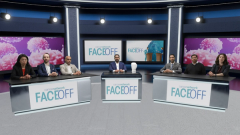
MARIPOSA: Final Overall Survival and Safety Insights From PALOMA-3, and COCOON
Experts partake in a dynamic, debate-style educational event where teams present and challenge current frontline treatment strategies for EGFR-mutant non–small cell lung cancer (NSCLC), focusing on the promise and practical challenges of combination therapy involving a bispecific antibody and third-generation EGFR tyrosine kinase inhibitor (TKI).
Episodes in this series

The program opens with an overview of a unique, debate-style educational event focused on optimizing frontline treatment strategies for EGFR-mutant NSCLC. Unlike traditional presentations, this program adopts a competitive format where 2 teams—Team Blue and Team Purple—debate current evidence and approaches. The structure includes 3 segments: data presentations, debates on hot topics, and the discussion of challenging patient cases. Although the event is educational in nature, it also emphasizes fun and dynamic engagement, encouraging participants to debate with enthusiasm without necessarily representing their own clinical practices.
Team Blue begins by presenting data from a recent phase 3 study evaluating a combination therapy involving a bispecific antibody and a third-generation EGFR TKI. The study demonstrated a statistically significant improvement in overall survival compared with monotherapy, including a notable benefit in intracranial disease control. However, the combination therapy also showed increased toxicity, including higher rates of dose interruptions, discontinuations, and adverse events such as venous thromboembolism and infusion reactions. Follow-up studies investigating subcutaneous administration and enhanced supportive care protocols showed reductions in certain toxicities, including dermatologic adverse effects and infusion-related complications.
In the discussion segment, Team Purple acknowledges the strength of the survival data but raises concerns about the regimen’s complexity and impact on quality of life. They highlight the difficulty of implementing intensive supportive care in community settings and the financial burden on patients. Team Blue responds by stressing the importance of structured, proactive management strategies to support patients on combination regimens. They also point to potential benefits in time efficiency, particularly with subcutaneous formulations. The debate concludes with both teams agreeing that although the data are promising, practical challenges remain in balancing efficacy with tolerability and patient-centered care.
Newsletter
Stay up to date on recent advances in the multidisciplinary approach to cancer.



































